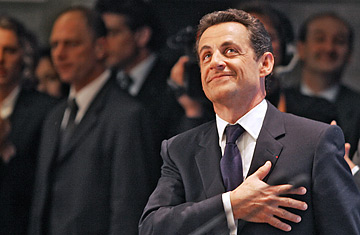
French right-wing presidential candidate Nicolas Sarkozy is applauded by supporters, May 6, 2007 after an unofficial announcement of the results of the French presidential election.
Although widely anticipated, Sarkozy's triumph nonetheless elicited an explosion of joy from supporters of his law-and-order, free market-reforming platform aimed at jump-starting France's sluggish economy. "This is a victory for the value of work and merit," exclaimed 19-year-old law student Thierry Bombet as he joined a cheering crowd of 10,000 celebrating Sarkozy's victory in the Place de la Condorde. "France is the only country in the world with a 35-hour work week — that's ridiculous!" agreed 21-year-old engineering student Fabien Pioli against the din of aging rock and rollers singing into the Paris night. "France needs an audacious leader, and I think Sarkozy will improve things for us. If he doesn't, I'm moving to the U.S.!"
Across the Seine, however, Royal backers remained strangely upbeat despite the defeat, reflecting an optimism born of the renewed engagement with politics among France's citizens reflected in the near-record 85% turnout. "Ségolène has changed the way a lot of us look at politics, and convinced us we can all make a difference," explained Royal voter Teddy Benam, 22, as 5,000 mostly young people danced in front of Socialist Party headquarters after Royal conceded defeat. "Sarkozy won tonight, but we'll be there for the rematch of legislative elections in June. If the left win those, Sarko's victory tonight will be a hollow one."
Despite the margin of his victory, President-elect Sarkozy was remarkably restrained in his victory speech. While his campaign had focused almost exclusively on domestic issues, Sarkozy emphasised international affairs on Sunday night, including an "appeal to our American friends to tell them that they can count on our friendship," but also insisting that Washington "accept that friends can think differently." He then scolded America for not accepting the Kyoto accords on global warming. He also called for greater European cooperation, and for a new trans-Mediterranean partnership to speed economic development in Africa countries, which he saw as important to help curb immigration into Europe.
After speaking of his lifelong love of France and pride of being French, Sarkozy reiterated the main domestic themes denounced by his opponents as pandering to the hard right, including restoring the values of patriotism, "work, authority, morality, respect, merit — [and] the nation and national identity". Still, Sarkozy was careful to note that, as President, he'd also defend the interests and sensibilities of those who voted against him. He reserved particular — and rare — praise for his opponent Royal, her voters, and "her ideals that so many French people associate with."
"Beyond the political combat, beyond the differences of opinion, for me there's only one France," Sarkozy beamed, pledging to be the President "of all French people".
Such magnanimity may have been easier to muster in victory, with his party now clearly in the lead to win the June legislative poll. But many Socialists remain confident. Voters like Benam like to point out that Sarkozy's abrasive positions on issues such as immigration and the condition of France's squalid suburban housing projects had left even many who voted for him admitting they were "scared." Benam hopes that this will encourage the electorate, in June, to put the Socialists in control of parliament as a counterweight.
Perhaps, but even many Socialist Party officials concede that no French Presidential victory by one party has ever been followed in short order by a legislative election that hands power to its opposition. Just as troubling for the left are the internal struggles clearly already under way to decide who will lead their campaign in June, with Royal's more centrist positions under attack from the left wing of the party.
"No one seriously is considering continuing the disastrous seduction of centrists," warned Jean-Luc Mélanchon, a member of the Socialist Party's hard-left flank. "It's clear that to avoid the right sweeping again, the Socialist Party will have to refocus and regroup, and bond with the wider left to win as many seats in parliament as possible," agree Socialist official Henri Weber. "That will be overseen by members of the party's leadership."
So, while an oddly pleased-looking Royal accepted defeat by promising voters "what we've started here together, we'll finish together," her place at the head of the campaign in June is already under question. As one senior Socialist official noted mockingly while she spoke, "Someone needs to tell her she cost us a very heavy loss — she looks and sounds as though she won."
While the Socialists scramble to rebuild themselves for June, Sarkozy has a program of a different sort lined up until he takes the Presidential baton from Chirac May 16. He has been effectively campaigning for President for much of the past five years; having won it, aides, say, he'll reward himself with a bit of well-deserved rest.
— with reporting by James Graff/Paris
